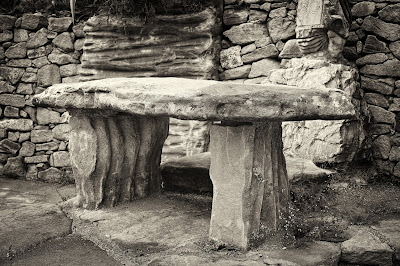Public Worship
Can Be Hazardous to Your Health
One of my favorite teachers on the subject of worship is Pastor
Jack Hayford, former senior pastor of Church on the Way in Van Nuys, CA. This week I am excerpting a portion from “A
Man’s Worship and Witness” where Jack gives his own unique spin on one the very
first worshiping communities—Cain & Abel (see Genesis 4).
Soiled hands
placed vegetables in a tidy arrangement on the rock altar. Cain felt proud of
his display. His brother, Abel, had begun assembling his own offering hours ago
and still wasn’t done. Cain was. All
Cain did was walk into his garden and pull up the fine specimens out of the
ground. They had grown all by themselves. And the garden was close by. It all
seemed so easy.
A smug smile
curled Cain’s lips. His brother- still searching out in the fields for an
offering- was laboring for nothing, Cain mused. He looked again upon the grand,
colorful altar. There it was. Vegetables. On the altar. Easy. This being one of
his first offerings, Cain wondered what exactly was to happen next. Pondering
this, he sat on a nearby stone and waited. He looked over at this brother’s
altar just as Abel came through the bushes carrying several ewe lambs. It
wasn’t long before the lambs were mounted on Abel’s altar and slain.
Cain noticed
that Abel’s altar was smaller than his. Good. Having sacrificed the animals on
the altar, Abel walked several paces back and knelt in prayer. Cain felt
uneasy. He hadn’t done that. But comforted himself by observing that Abel’s
altar was blood-stained and dirty, while his was neat, tidy and colorful:
orange and red and yellow and green and – just then: Whoosh! Brilliant flames
from out of nowhere- from another realm- licked up all of Abel’s sacrifice! All
of it! Cain jumped to his feet. A few ashes drifted in the breeze. The colorful
harvest on Cain’s altar remained defiantly the same-unchanged. Nothing happened
to his.
Cain stormed
off, angered and pouting. And it was later, as his tormented mind seethed with
hatred and jealousy, that the Lord met him near a tall palm tree: “Why are you
angry? And why has your countenance fallen? If you do well, will you not be
accepted? And if do not do well, sin lies at the door. And its desire is for
you, but you should rule over it” (Genesis 4:6,7).
Shortly,
Cain’s competitive jealousy grew to such intolerable levels that he rose in
fury to kill his brother, Abel. And thus, the record teaches us: the first
murder was born in the heart of a man who resisted God’s ways of worship. The first
victim of violence was a man who worshiped God physically, openly, and freely.
Personally I am challenged by this story…not only from the
original text, but also by the way Hayford has drawn applications for us as a
worshiping community. From this, I have
come up with a list of takeaways:
- As we bring an offering to God (ourselves), He wants all of us, not what is comfortable or convenient.
- Nothing less than our very best is really worthy of God.
- He doesn’t require what He does not provide.
- Man looks at the outside—God looks at the heart.
- No true act of worship can be separated from the need for the shedding of blood. Either we return to the old animal sacrificial system or we adopt God’s new covenant offer of the life of His son. (Without the shedding of blood there is no forgiveness. - Hebrews 9:22)
- Uncontested spiritual warfare can be deadly. For the time being, Cain, an enemy of true worship, succeeded in quelling the sacrifice of praise offered by his brother. But unlike Abel, we are not left alone to be victimized by the Enemy in an effort to silence our praise. This is why we often pray that God would “bind the enemy” (Mark 3:27) prior to our worship experiences. We believe the One in us is greater than the one who is “in the world.”)
- If we allow our worship to go public, it will impact others. Some might be blessed and encouraged. Others will begin to pull away from us or, worse, try to discredit us.
- As Abel learned, worshiping freely with abandon in public places can be hazardous to your health! At the very least it can result in you being judged, ridiculed, less popular. Kind of like Jesus.
- In the end, warring over whose worship is more Christian or appropriate or godly still misses the mark. As wrong as Cain was, he still was not beyond redemption. The writer to the Hebrews reminds us, “You have come to Jesus, the one who mediates the new covenant between God and people, and to the sprinkled blood, which speaks of forgiveness instead of crying out for vengeance like the blood of Abel.”
- Sincere and God-focused worship touches His very heart! (“The Lord looked with favor on Abel and his offering...” 4:4)
tad



